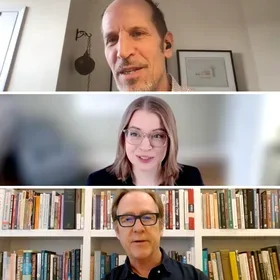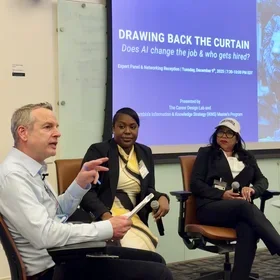By Greg Costanzo | Director of Employer Relations, Career Design Lab, Columbia SPS
International students face a set of unique challenges in the U.S. job market – challenges that are compounded as unpredictable and stricter immigration policies are announced. Where do international students go for hope and inspiration? To answer that question, I spoke with recruiters from global management consulting firm Bain & Company for their insights and advice. Sharon Fry, Partner at Bain, Columbia University alumna and Columbia Business School recruiter, along with Kimberly FitzGerald, Director of Global Recruiting, talked about the firm’s commitment to supporting international talent, the importance in attracting diverse workers and how to avoid the pitfalls of the case interview.
Greg Costanzo: Please share a little bit about your professional backgrounds.
Kimberly FitzGerald: I have been at Bain my entire career – 20+ years working on our global recruiting team—where I have held a number of roles primarily focused on hiring MBAs into our consultant roles.
My role today spans three different areas: one is our recruiting system, another one is training and development for our recruiters and the last is our core MBA schools.
Sharon Fry: I am a 2009 Columbia Business School graduate and in the summer of 2009 I was an intern at Bain’s New York office. I moved onto a full-time role after that internship and have been here ever since – a total of 11 years at Bain and 14 years in consulting. I am primarily focused on healthcare private equity work for our investor clients. I also work with corporate healthcare clients and I'm fortunate to lead our Columbia Business School recruiting with Kim; it’s just a really talented group of people on the recruiting side.
Greg: Bain is a global consultancy firm that’s located in 37 countries. Given both of your backgrounds and experiences in global recruiting, it's safe to say that you know what it takes to attract and recruit global talent. Can you tell me a little bit about what it takes to successfully staff roles?
Sharon: Ultimately, we are a people business and we are very focused on finding the top business talent globally and putting people in offices where they want to be for personal and lifestyle reasons, obviously within the bounds of government regulations. But as we're looking for people to join our team, we're really looking for diverse thinkers, people who bring different skill sets. We pride ourselves on trying to create extraordinary teams. Bringing some diversity of thought to that is one part of delivering on that proposition. And then we're also looking for people who display curiosity to learn, want to build their careers, and are passionate about our business.
Greg: After talent has been placed and they've proven to be high-performers — you must have seen this many times over in your careers — have any patterns emerged? Perhaps characteristics, personality traits or things that you could point back to in the sourcing or interview process that foretell success?
Sharon: It's hard to kind of say there's one type of person or specific characteristics. We draw people from very diverse backgrounds and from very diverse geographies. There are so many people who are qualified and so smart at all the schools that we recruit from, but I think it's that attitude of really wanting to collaborate and work internally with clients that helps people to be successful.
Greg: I want to jump now to one of the student questions. Are there any signs that may suggest to candidates how they are doing in the consulting recruitment process in the absence of any direct feedback from a recruiter or hiring manager?
Sharon: The case interview is an important part of the interview process. Invest the time to where you feel like you're going to be putting your best foot forward, but don't drive yourself crazy. Just make sure that you feel comfortable; you don’t want to be unfamiliar with the case process and thrown off during the interviews.
We try to put together a diverse set of recruiting activities so that people can really pick and choose parts that appeal to them. Attend some of the events and talk to folks at the firm throughout the recruiting process. And when you’re in those interviews, be sure to express what excites you about the process and how’d you be a great part of the team.
Kimberly: The one quick thing that I would also add is that it’s not about the number of events that people attend or how many people at the firm recruits reach out to. We want recruits to engage and make sure their questions are getting answered. And that doesn't mean reaching out to multiple people if one or two are able to answer your questions.
Sharon: I know what it was like going through this process as a graduate student. I certainly felt the stress of trying to figure out what was the right way to navigate the interviews. So as recruiters, we do our best to reassure folks that there are many ways to be successful in the recruiting process.
The case interview is an important part of the interview process. Invest the time to where you feel like you're going to be putting your best foot forward.”
Greg: One thought that may be on the minds of people going through this process is that, “The more people I talk to within the company, the greater chance I can be referred.” That can be a perceived advantage. Is that true, and if so, is there a right or wrong way to get a referral at Bain? What does that look like and how should students approach that?
Sharon: I would first say that you don't need a referral to be successful here. We try to have a pretty wide interview process, giving as many individuals as we can a chance to get to know the firm through recruiting events. When we move into interviews, candidates may have great interactions with team members and they end up sending kind words to the hiring manager. That's always great to see, but I don't know that it ends up mattering all that much in the recruiting process. It's much more about the person's experiences, why they're interested in joining Bain and then ultimately, how they do in the interviews. So getting a referral is definitely not something that people should feel pressure to do.
Getting a referral is definitely not something that people should feel pressure to do.”
Greg: My Student Affairs colleagues and I sometimes hear from international students who we coach that they don't feel welcome in the U.S. They feel that it's a hopeless endeavor to simply complete their studies at an American college or university, let alone find work in the U.S. What advice would you give to students in this situation?
Sharon: First of all, we are very sympathetic to students who have been dealing with some of the news headlines and trying to figure out their own personal situations and hope that everyone gets to a positive resolution. From a recruiting perspective, we are an international firm. We have offices around the world with very diverse teams.
The qualities that we look for in candidates are universal. We want people to join our team who are excited to solve complex challenges that are facing our clients. We put our people first. We work within government guidelines to ensure that we're able to bring in employees wherever they are. And we continue to support non-U.S. students who want to work in the U.S.
There certainly have been some challenges but we are committed to trying for students who aren't successful in the immigration process. And if we can’t get them into one office, we help them get into another office. Again, we want top global talent and we're committed to doing everything we can to make that possible.
We are committed to trying for students who aren't successful in the immigration process. And if we can’t get them into one office, we help them get into another office.”
Greg: To increase international students’ chances of success, it sounds like good advice for them is to look for opportunities internationally, especially those in their home countries.
Sharon: The advice we give to recruits is that they should apply for where they want to live. One benefit of being at Bain is that there's a lot of flexibility. Many people have worked across multiple offices, so you don't necessarily have to be committing to just one geographic location. We advise that people be upfront about where they would like to live and have a conversation around that.
As career coaches, we’re always telling students to “network.” Building relationships with people who are doing the things you want to do or are working at the companies that interest you is a smart tactic. You may not see results for quite some time, but it has the chance to open doors that can surprise and delight. To hear from veteran recruiters at one of the most respected and sought-after consulting firms say that networking and referrals don’t carry as much weight once a candidate is in the interview process was surprising. But then again, given all the diverse activities recruits engage in at Bain, I could see how they are guided towards identifying areas that clearly align with their goals and interests, and how that ultimately becomes visible to the recruiters.
No matter what your country of origin is, Bain not only welcomes talent from all over the world, but they also seek it. They want curiosity, creativity, active listening skills and adaptability. There’s not one country that has a monopoly on that sort of talent. So international students: do apply!


